- Home
- Bette Lee Crosby
Cupid's Christmas Page 2
Cupid's Christmas Read online
Page 2
Everything happens for a reason. If humans could accept that, my job would be so much easier. After Lindsay hurled all of the never-to-be-seen-again model’s belongings out the window, she broke into huge shuddering sobs and telephoned Amanda. That break-up was slated to happen anyway, but the timing was my doing. Since Lindsay had shown no interest in Christopher from 7B, he’d been reassigned to Amanda. That night Christopher was leaving the building as Amanda was coming in. When the plan works, that’s all it takes—a chance meeting, a fleeting glance and POW…love happens.
Eleanor
John hasn’t told his daughter about us yet. He doesn’t see it as a problem, but I’m not so sure. He claims Lindsay is an open-minded person who’ll be happy for us. But I’ve come to realize kids don’t always take kindly to their parents remarrying. My Son had a conniption when I told him.
I invited Ray and his wife to dinner that evening, thinking a pleasant visit and a full stomach would make hearing the news a bit easier. It sure didn’t go like I thought it would. Before I finished explaining what a fine man John is, Ray jumped out of his seat and started peppering me with questions like he was the lead prosecutor. “Don’t you see he’s after your money?” Ray kept asking. I told him I didn’t have any money for John to be after, but then he switched over to badgering me about John taking over our house. I was tempted to tell him it wasn’t our house. It belonged to his daddy and me.
Finally when I couldn’t take any more, I stuck my face in his and told him John and I were planning to sell both houses and buy a place of our own. Of course that opened up a whole new can of worms, and I’d never even mentioned anything about how we were thinking of buying that house in Florida. “Ah-ha,” Ray shouted, “You’ll sell the house, hand over the money and that’s the last you’ll see of that buzzard!”
I turned to Traci, his wife, thinking she’d jump in and give me some support. But one look and I knew she wasn’t going say anything. She was sitting there looking like she had a sour pickle stuck sideways in her mouth.
After two hours of such nonsense, I told Ray he’d better go on home and get used to the idea because like it or not, I was going to marry John. When Ray stomped out the door, Traci followed along. At the last minute, she turned back and mumbled, “G’nite.” That was the only word she’d spoken since the first mention of John’s name.
I’m praying Ray will simmer down and come to accept the idea. I’d like him to be happy for me, be glad I’ve found somebody, be glad I won’t grow old sitting here alone. Right now he thinks the worst of John, but I’m betting he’ll have a different opinion once he meets him.
Kids might think their parents are too old for love, but I can say for a fact it’s not true. John makes me feel something I haven’t felt for years. When he kisses me and traces the edge of my cheek with his thumb, I get a tingle that goes clear down to my toes. He feels exactly the same. I know because if we’re apart for one afternoon he calls to say how much he’s missing me. Ray’s daddy never did that, not even when we were first married.
Cupid…Mistakes & Misconceptions
Lindsay is not at all like her mom. Bethany was a practical woman who looked at life and saw it for exactly what it was. At the end of each day Bethany packed her troubles into a closet of forgetfulness and the next morning she awoke to a new day and another chance at happiness. Lindsay, well she’s another story.
After her breakup with Phillip, she moved through the days like a person with no reason to live. Tuesday through Saturday, she left her apartment at the same time, stopped at the same Starbucks and worked at the bookstore from nine until six-thirty. Day after day she returned home carrying an armload of books. In the evening she read until her eyes were weary and then went to bed. On Mondays she cleaned the apartment then went right back to reading.
You might think that after centuries of dealing with humans I would be accustomed to their peculiarities, but certain ones, like Lindsay, still boggle my mind. The end of a love affair is always cause for a certain amount of despondency, but this girl carried it to the extreme.
While she was at the bookstore Lindsay spent most of her time walking from aisle to aisle, looking for books that had nothing to do with love. She avoided the romance section and took to browsing the exotic cuisine and travel shelves, even though she had little appetite and nowhere to go. One evening as she staggered in with an unusually large armload of books, Walker, the building doorman, lifted several from the top of the pile and followed her to the elevator.
“Thanks Walker,” she said, “I think they were about to fall.”
He nodded, “Seems you’re doing a lot of reading these days.”
“I am,” she replied, “It helps pass the time.”
“Pass the time?” He set his pile of books down on the foyer bench then took the remaining books from her arms and placed them beside the first pile. “Why would a girl pretty as you need books to pass time?”
“It’s a long story…” she gave sigh that came from the pit of her stomach and swirled through her chest, “I had this terrible argument with Phillip and…”
“I know,” Walker nodded, “I heard the noise. When I went to take a look at what was going on, I spotted him scooping his stuff off the street.”
“We’re through. He won’t be back.”
Walker smiled, “Good. You deserve better.”
“I do?”
“Sure. That guy was no gentleman.”
I could see the wheels turning in Lindsay’s head…She’d looked at eyes, muscles, even the swagger of bravado, but not once had she searched for a lover who was a gentleman.
“How can you tell he wasn’t…” she asked Walker.
“People don’t notice me standing here, but I see things…”
“What things?”
Walker went on to say how he’d seen Phillip walk through the door first and let it swing shut on Lindsay, how he’d let her struggle with packages and not offered to help, and how he’d openly flirted with the girl in 9A. Walker was a man who knew heartache close up. He’d experienced it in his own family, so he never mentioned that he’d also seen Phillip in Washington Square Park, kissing a woman who was old enough to be his mother.
Lindsay listened as he told her about his daughter, “My Emily got mixed up with the wrong man,” Walker said, “and she’s had a real hard life. That no-good walked off and left her with two little girls to raise and no money to pay the rent or buy a bag of groceries.”
“How awful,” Lindsay gasped.
“It was awful alright, but by then the deed was done. She couldn’t do a thing about it.”
The tale of a girl far worse off than herself caught Lindsay by the throat, “What happened to Emily and her daughters?” she asked fearfully.
“Three years later Emily met a fine church-going man and married him,” Walker said. “That man took care of those girls like they was his own.”
“Thank goodness,” Lindsay sighed.
“Amen to that,” Walker said. “Most important thing about any man is his principles. A man with no principles ain’t worth the shoes he wears on his own feet.”
Lindsay nodded, although she was clueless as to how one could identify principles.
“Phillip was a no-good,” Walker continued, “I knew it right off. I would’ve said something, but it ain’t my place to be sticking my nose into other people’s business.”
“Oh Walker,” Lindsay sighed, “I wish you had.”
“Yeah,” he said, “…and I wish somebody would’ve told Emily too.”
Knowing Lindsay’s state of mind, you might think she’d be pulled into a deeper depression by this news of Phillip’s behavior, but for the first time in many months she began to think a bit more like her mother. She could suddenly see that maybe, just maybe, Phillip had been one of a kind. A single bad apple. One bad apple didn’t make the whole barrel bad, she reasoned. Maybe there was a chance that someone… somewhere…
She and Walker continued ta
lking for nearly an hour and when she got to her apartment, she set the books aside and turned on her computer.
Lindsay had thirty-seven unanswered e-mails, nine of them from her father. She opened the most recent one and read it. He expressed concern that he hadn’t heard from her, he’d been hoping she’d come home for a visit, they needed to talk.
She reread the e-mail and added thoughts that were nowhere on the page. The words miss you made her picture her father a lonely old man, someone reaching out for love and companionship. Come home was a plea of desperation. Needed to talk most likely meant he was ready to give up on life. The image of her father’s sorrow outweighed her own, so Lindsay clicked reply.
____________________________________
Hi Dad,
Sorry I’ve been so bad about writing, I’ve been kind of down because of what happened with Phillip, but I’m sure it’s nothing compared to what you’re going through. Tonight I had a long talk with Walker, our doorman, and I’m beginning to think I did the right thing after all.
I understand how lonely you are and how much you miss Mom. I miss her too, more than you can imagine. But at least we’ve still got each other and I promise to spend more time with you so try to cheer up. I’m going to take the first week of September off and come home for a visit. It will be such fun, just you and me, like the good old days. How about having a Labor Day Cookout? Do you have a recipe for those baked beans Mom used to make?
_____________________________________
Lindsay clicked send then opened the notice of a Lord and Taylor sale that ended a week ago, responded to an Amazon survey and half-heartedly replied to Amanda’s note that went on at length about her new boyfriend. Before she finished going through the remainder of unanswered mail, the answer from her dad popped up.
_____________________________________
Great. Love to have you home for a while. Sorry, I don’t have the recipe for your mom’s beans, but I have a friend who can help us figure it out.
Lindsay, your mom is someone neither of us will ever forget, but time has a way of healing the hurt of such a loss. I’ve learned to move on and make the most of life. I hope you have also. We’ll talk when I see you. Looking forward to your visit.
Glad to hear you’ve become friends with Walker. Trust what he says, he’s a good man. I’ve spoken with him many times.
Love, Dad
_____________________________________
Lindsay reread the last line. Dad’s spoken to Walker? Had Phillip? She buzzed the lobby desk on the intercom.
“Front desk,” he answered.
“Hi Walker, this is Lindsay again. Did Phillip ever stop and talk to you?”
“No. Never.”
“But my Dad did, right?”
“Indeed he did. Every time he came to visit, Mister Gray would stop and ask how I’m doing. He’s a fine gentleman, the type who does right by people.”
“That’s exactly what I was thinking. Thanks, Walker.”
I knew precisely what she was thinking, I couldn’t stop the thought, but I knew it was coming. Lindsay is one of those humans who see true love the way others see a heat mirage—always in the distance, flickering, wavering and changing shape. After her conversation with Walker, this was inevitable.
Lindsay pictured the men she’d been dating. They were handsome, broad-shouldered, muscular, skin tight shirts, leather jackets, slouched stance, most of them a height close to her own and every single one of them with a sexy glint in his eyes. How, she wondered, could she have been so blind as to not notice this?
She lifted a picture from the desk. It was taken nine years ago, when Bethany was alive. In the picture her father was looking down at the woman by his side with a look of adoration, one Lindsay had never seen on the faces of men she’d dated.
Lindsay closed her eyes and again pictured the men she’d dated but, little by little, their faces disappeared into the heat mirage that shifted and changed shapes. Pictures flickered and danced until all of the men had coalesced into a singular image. Dark hair was changed to a lighter brown, the muscle shirt and jeans replaced by a suit. And when the suit seemed a bit too stiff, it wavered and became a sport jacket and slacks. Little by little, the image came together until Lindsay could see exactly who she was looking for—it was a younger version of her father.
As Lindsay slid into bed that night, she knew she had designed a man with principles. She closed her eyes and brought the image to mind again. “Perfect,” she sighed. She held onto the picture until sleep came and carried her away.
I suppose you know without my saying, this can only lead to trouble. Only the most foolish humans believe true love is based on hair color, or the garments that adorn a body. For centuries I’ve listen to humans expound on how they fell in love with a person’s eyes or their voice—if I had a raindrop for every time a male has claimed to have fallen in love because of a female’s breasts, I could easily flood all of Manhattan. The truth is love comes from that tiny spot in a human’s heart, the miracle spot, but no human has ever figured it out. They’ve tried. In fact the brightest minds of all time have tackled the challenge and not one has come up with the right answer. Instead they create profiles and rationale to set up a website promising these gullible love-starved humans the perfect mate. Hah. Granted the humans are getting better at this game, but perfect matches come from one place and one place only—me.
John Gray
It’s been ages since Lindsay’s been home, I’m glad she’ll be here for Labor Day. It’s time I introduced her to Eleanor. With her mother gone all these years, I know she misses having a woman in her life. Women talk about things a man is no good at and Eleanor, well, she’s a person you can’t help but love. I’ve had a fondness for Eleanor since the day we first met and that was over thirty years ago. She’s been good for me, and I think she’s gonna be good for Lindsay too.
After Bethany died in the crash, I hated myself for being alive. I kept asking God why He couldn’t have taken me instead of her. Living in this house was like living in Hell. Everywhere I looked there were reminders of Bethany—her sewing basket, slippers by the side of the bed, a robe hanging on the back of the door—she was in every room, and I couldn’t bring myself to get rid of even one thing. I can’t count the number of times I answered no when the Mustard Seed lady called and asked if I had any used clothing to donate. I was sleeping on a bed of nails and didn’t have the courage to move elsewhere.
Lindsay was living at Rutgers then. I think she stayed there partly because it wasn’t a place filled with reminders of her mother. I can’t say I blame her, but there were plenty of times I thought of calling and asking her to move home. The only thing that stopped me was Bethany’s voice whispering in my ear about how unfair such a thing would be.
Sometimes the loneliness got so bad I’d climb out of bed in the middle of the night and walk from room to room checking to see if anything had changed. Now I can see I was wallowing in my own misery, but back then I couldn’t see it. I couldn’t even bring myself to sleep in the middle of the bed. At night when I’d get into bed, I’d stay on my own side and leave Bethany’s pillow laying there like a turned-over tombstone.
About a year after the accident, the doorbell rang, and when I answered it I was face to face with George Grumman. Even though it was icy cold and sleeting he stood there with his hat in his hand and his eyes focused on his shoes. My first impulse was to grab him by the throat and choke the life out of him, but then he began talking and I could see he was living with the same kind of misery I was. I opened the door and asked him in.
“I’m so, so sorry,” he said. When George spoke I could hear the quiver in his voice. He went on to tell me how his little girl had been taken to the hospital the morning of the accident. “I had to work,” he said, “but Maggie promised she’d call and let me know how our baby was doing…” He stopped, blew his nose then continued, “…the phone was right there on the seat but it had slid across to the other side
. I looked to find it and in that few seconds…” he stopped talking and began sobbing. The sound of his grief was so muffled I could barely hear it, but I saw the way his shoulders shook and his head fell forward. We talked for a short while longer and with his remorse so evident I found it harder to hate the man. As he got up to leave I asked how his daughter was doing. “She died two days after the accident,” he said. Then he walked out the door, and I never saw him again.
I thought about that visit for well over a week and I was still thinking about it the night we had a thunderstorm that knocked out the power. I sat there in the dark for what might have been two hours then I finally gave up and went to bed. I’m not prone to dreaming, but that night I did, and the dream was so vivid I can remember it to this day. Bethany was dressed in a summertime dress and she was as young and pretty as the day I married her. I couldn’t see myself but I knew I was the one walking along beside her. She turned to me and said, Don’t forget, then she laughed that same great laugh I fell in love with. I tried to tell her that if I live to be a thousand I couldn’t forget her, but she covered my mouth with her fingers. Silly, I’m not talking about me! Don’t forget how to forgive or you’ll forget how to love. She opened up the suitcase she’d been carrying and motioned for me to look inside. As I gazed down at the case I could feel her alongside my shoulder. She leaned close and whispered in my ear—Do you see me inside there? I shook my head. It wasn’t Bethany, but it was all the things she’d left behind. She laughed again then picked up the suitcase and flung it into the sky. I could see myself trying to catch her sewing basket and the blue robe, but it was like trying to catch the wind. When I turned back she was gone, but I could still hear the sound of her laughter.

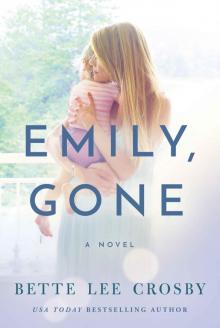 Emily, Gone
Emily, Gone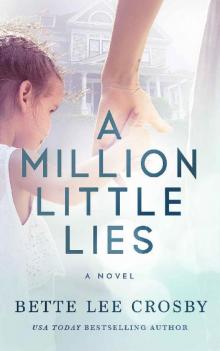 A Million Little Lies
A Million Little Lies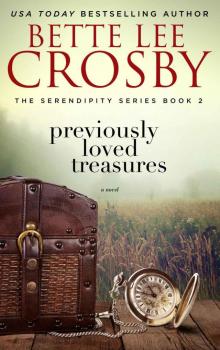 Previously Loved Treasures
Previously Loved Treasures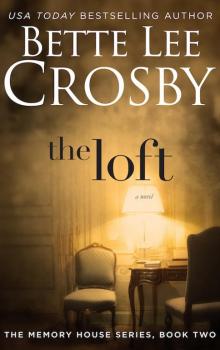 The Loft
The Loft Spare Change
Spare Change Memory House: Memory House Collection (Memory House Series Book 1)
Memory House: Memory House Collection (Memory House Series Book 1)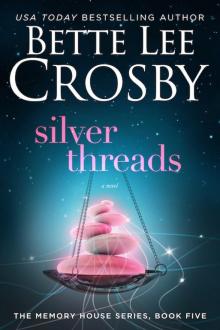 Silver Threads
Silver Threads Wishing for Wonderful: The Serendipity Series, Book 3
Wishing for Wonderful: The Serendipity Series, Book 3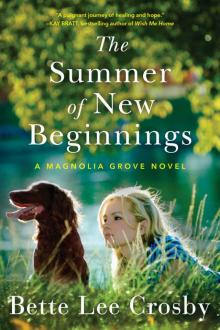 The Summer of New Beginnings: A Magnolia Grove Novel
The Summer of New Beginnings: A Magnolia Grove Novel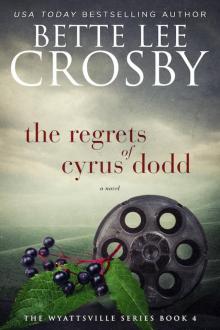 The Regrets of Cyrus Dodd
The Regrets of Cyrus Dodd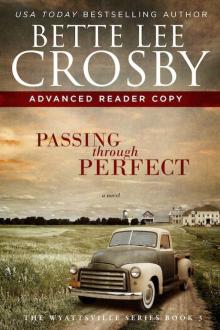 Passing Through Perfect
Passing Through Perfect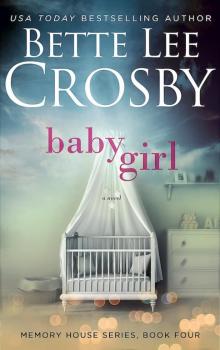 Baby Girl
Baby Girl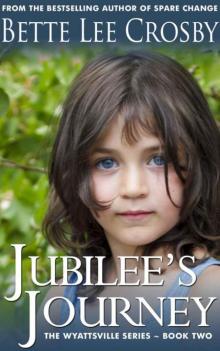 Jubilee's Journey
Jubilee's Journey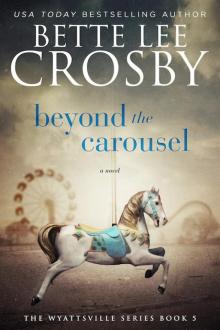 Beyond the Carousel
Beyond the Carousel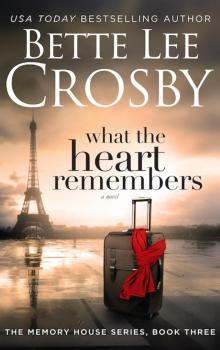 What the Heart Remembers
What the Heart Remembers Cupid's Christmas
Cupid's Christmas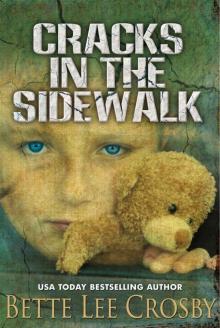 Cracks in the Sidewalk
Cracks in the Sidewalk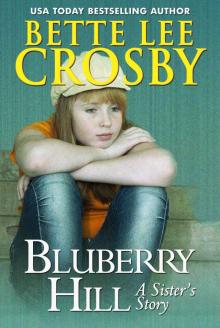 Blueberry Hill
Blueberry Hill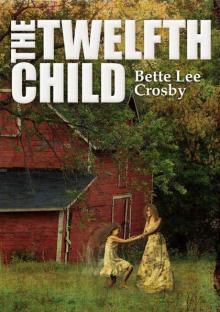 The Twelfth Child
The Twelfth Child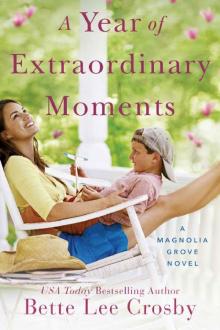 A Year of Extraordinary Moments (A Magnolia Grove Novel)
A Year of Extraordinary Moments (A Magnolia Grove Novel)